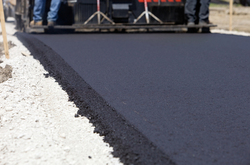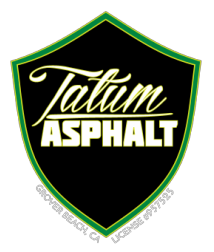New Asphalt Installation & CARE

What are the advantages of asphalt over concrete?
Asphalt is most times more cost effective than concrete to install, and less expensive to repair. It usually does not need to be removed, it can easily be resurfaced. Asphalt is designed to flex with hot and cold weather as well as slight settlements.
Is asphalt pavement high maintenance?
All pavements require maintenance. Preventive maintenance is less expensive, if early detection and repair of minor defects are taken care of before major corrective action is necessary. A parking lot is an investment, just as a building must be maintained, so must a parking lot/area.
How thick do you lay the asphalt?
This depends on many factors. Asphalt is generally a minimum of 2" thick, however it can be as thick as 6" depending on what kind of stresses you will put on the pavement. If you have more heavy weighted vehicles driving over your asphalt area, properly installed base and thicker asphalt layers should be installed. We meet with you to go over what your needs are to determine the thickness your project will need to sustain longevity.
How long will a new asphalt driveway or parking lot last?
Properly installed with good product, customers can expect 20-25 or more years... With properly scheduled maintenance, many projects can last for 40 to 50 years+. With out scheduled maintenance the asphalt typically lasts in the 10-15 year range.
How long after paving new asphalt can I drive and park on my driveway?
Once the asphalt has been compacted by the rollers it is OK to walk on right away but you'll want to wait a minimum of 24 hours before driving on and parking in your new driveway. It is best to allow 48 hours if you can.
How long does a new asphalt driveway take to cure?
In order for driveway to fully harden the Asphalt Cement needs time to cure. To fully cure typically takes about 6 months to a year. During the first year your new driveway may become soft or tender on very warm days. This is normal, but care should be used on these days.
For example:
• Don’t turn the steering wheel of your vehicles without the car moving.
• Avoid parking in the exact same spot every day.
• Avoid peeling out.
• Be aware that pointed items such as kick stands on motorcycles, folding chairs, jack stands, or even a bicycle kickstand could make an impression.
• Don’t use gasoline, oil, anti-freeze, or transmission fluids over asphalt. If you do have a spill with one of these items use a powder substance to soak up the spill ASAP, allow to dry and sweep up. These items will eventually eat thru unsealed asphalt if not remedied.
What else can I do to properly care for my asphalt investment?
Adopting a routine maintenance schedule is the best thing you can do. Asphalt repairs are necessary within time as asphalt surfaces begin to wear and break down as they are repeatedly exposed to the elements such as traffic wear and tear, water penetration, surface oxidation from the suns UV rays and oil and chemicals that drip from leaky vehicles. Surface breaks of any kind allow moisture to percolate below the surface, where it undermines the integrity of the pavement. The liquid asphalt (Asphalt Cement) that binds the materials together begins to lose its natural resistance to water, allowing it to penetrate beneath the surface. Once this occurs the asphalt pavement loses its elasticity and can quickly fall prey to a number of different types of deterioration including cracks and potholes.
Take care of any distress or damage right away. If caught early it can easily be repaired by installing one coat of commercial grade slurry seal and maybe some crack fill, if needed. Sealcoating replaces the lost asphalt cement, sand and moisture extending the life of your asphalt. If not seal coated the asphalt will continue to dry out and heavier distress will eventually show, an unmaintained driveway could need to be overlayed or even torn out and replaced after only 10-15 years.
How Long should I wait to seal coat my newly installed driveway?
It's a common misconception that applying slurry to new asphalt is damaging. There are very different points of view here. Typically its recommended a minimum of a year, but we've heard some recommend to have it done after 6 months. The reason you want to wait to have your new asphalt investment sealed is because the oils that bind the sand, aggregate and rock together don't allow the slurry to adhere to the surface as well. On a high traffic area like a parking lot the slurry would begin to pop and peel in random areas. Making the installation unnecessary, more of a waste of money than doing damage. So most asphalt contractors recommend to wait to seal it until oils have cured out of the asphalt.
We believe the reason there are many different recommendations of how long to wait to seal is because of the different types of weather we have across the country. Asphalt in the dessert is going to cure and weather faster than in a coastal area that is has mild weather extremes.
What we recommend is to test your newly installed asphalt to see if its ready...
To test to see if the asphalt is ready to be sealed, Pour water on the asphalt surface, Fresh asphalt has oils in it that need to cure out, if the water beads up and you see a light rainbow the oils are still there. If the water spreads out evenly and doesn’t bead up and doesn’t have a light rainbow it's OK to seal. Once the asphalt has been seal coated, it's recommended you re-seal your asphalt every 2-3 years, depending on the amount of wear and tear and heat your asphalt sees. Parking lots that see a lot of traffic should re-seal maximum every 2 years... driveways can typically wait 3 years.... Sealcoating your asphalt can more than double the lifespan of your driveway!!
